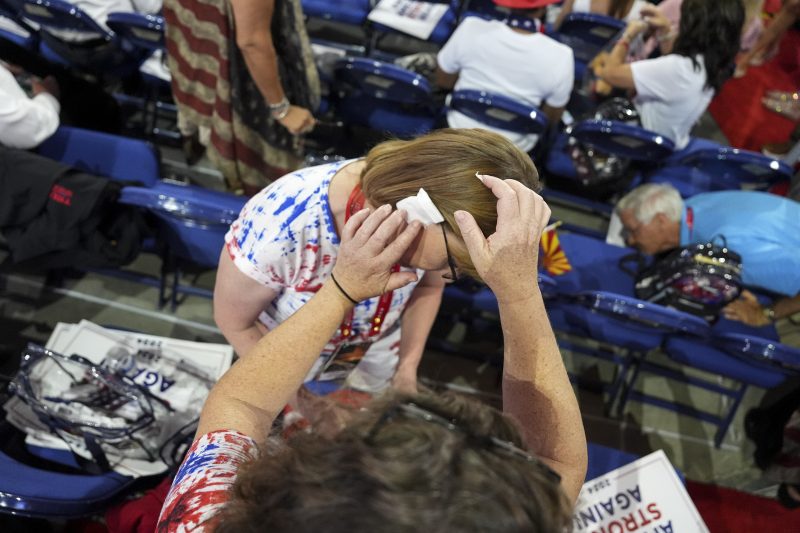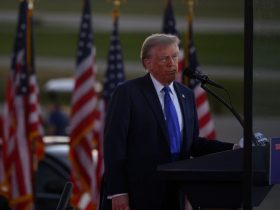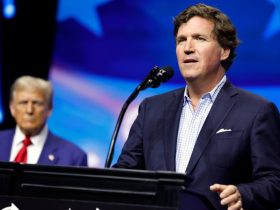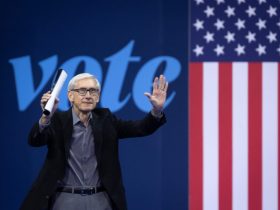MILWAUKEE — The hottest fashion accessory at the Republican National Convention is the ear bandage.
The bandage can be made of sturdy paper, of flimsy napkin, or of gauze and tape, but it must always be white, and always worn covering the right ear — exactly the way former president Donald Trump first appeared when he entered the convention hall Monday evening, his highly anticipated public debut following an assassination attempt at a rally just two days earlier.
In the most electrifying moment on the convention’s opening night, Trump strode into Milwaukee’s Fiserv Forum in his trademark dark suit and oversize red tie — and with a small white bandage affixed to his right ear, where he was injured in Saturday’s shooting.
By the following day, a small cadre of Trump’s most loyal supporters had begun sporting makeshift bandages on their right ears — in sympathy and support for Trump, several bandage-clad delegates explained.
“It’s a new sign of unity within the party,” said Joe Neglia, a Republican delegate from Arizona who says he was the first to make an ear covering out of white paper and affix it to the side of his head. “When I saw him come out Monday night — that magical moment — I thought, ‘I have to do something,’ and this is what I could do.”
On the convention hall floor, the Trump-inspired ear bandage is hardly as ubiquitous or iconic as, say, his trademark red Make America Great Again hats.
But what started with Neglia and the Arizona delegation spread to other delegations, from Texas to Washington State.
Neglia made his bandage Tuesday morning on the bus ride over to the convention, said Craig Berland, the chair of the Maricopa County GOP — but they didn’t have any gauze.
So that night, Berland said, “the girls” — other delegates traveling with them — went out to fetch gauze and tape. He estimates that at least half of Arizona’s 40-plus-member delegation is now wearing bandages.
“It’s a sign of solidarity,” he said in an interview on the convention floor.
Liam Donovan, a Republican strategist attending the convention, said he was “impressed that American ingenuity responded so rapidly to fill this market.”
“But for all the stylistic flourishes of the Trump era, from hats to sneakers, this one seems the most organic,” Donovan said. “It was truly a surreal moment that people are still processing, and this is a recognizable show of solidarity in a meme-ified political moment.”
The Washington Post spotted about a dozen delegates wearing the self-fashioned bandages on Tuesday and Wednesday, but it was unclear how many total were in the cavernous arena. The Trump campaign did not immediately respond to a request for comment about the proliferation of bandages.
Texas delegate Jackson Carpenter — sporting matching Texas flag shirts and cowboy hats with the rest of the delegation — added the bandage to his ear when he learned another delegate was passing them out.
“We need a symbol about political violence not being acceptable in America,” Carpenter said.
And Zachary Landsdowne, a delegate from Washington State, said he had originally fashioned his homemade ear cover from Band-Aids he’d brought from home in case he cut himself in Milwaukee. But his right ear didn’t start getting much attention until he swapped out the beige Band-Aids for white paper.
Having alighted on what he believed to be a winning formula, Landsdowne then offered some light judgment on the stylings of fellow delegates: “I saw one guy with an entire napkin against the side of his head, but it didn’t look like a bandage,” he said with a laugh.
Indeed, the bandage is quite simple to make. “I got this white paper and rolled this tape here and folded the top part so it can stay on my ear like this — voilà,” Neglia said. “I’m breaking new fashion ground.”
Arizona delegate Liz Harris said she went to the only Walgreens she could find open at 11 p.m. after the convention was gaveled closed for the day and bought gauze pads and surgical tape, which she proudly displayed on the floor Wednesday night.
And when she heard that some people online had referred to their trend as cultish, she scoffed.
“It’s in solidarity,” she said, echoing Berland, the Arizona delegate.
Just as Harris was saying she wished others might use her newly purchased medical supplies, fellow Arizona delegate Michael Schaffer walked up with an unadorned right ear.
“We’ve got a patient,” she said excitedly, as she began unraveling tape and ministering to his naked ear.
Maeve Reston contributed to this report from Milwaukee.










